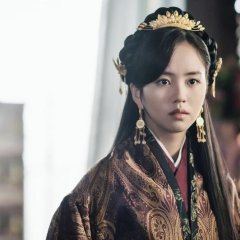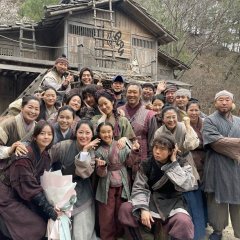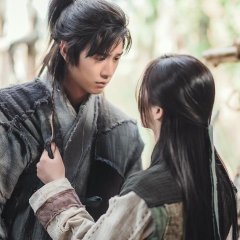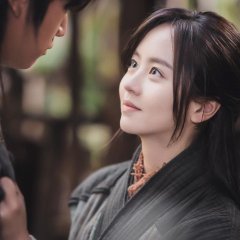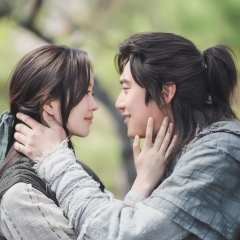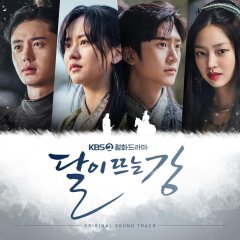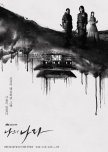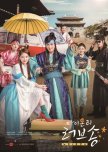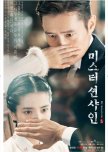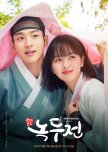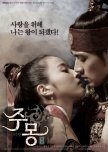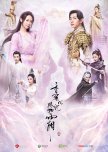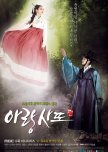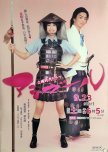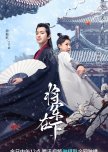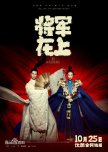 Han So Hee Receives Another Casting to Lead a K-Drama Helmed by "Queenmaker" Director
Han So Hee Receives Another Casting to Lead a K-Drama Helmed by "Queenmaker" Director Née princesse et élevée soldate, Pyeong Gang (Kim So Hyun) est une femme aux grands rêves et à l'ambition illimitée. Souhaitant ardemment devenir la première Impératrice de Goguryeo, Pyeong Gang ne reculera devant rien pour réaliser son rêve. Intelligente et réfléchie, Pyeong Gang est bien consciente des obstacles qui se dressent en travers de son chemin et elle est plus que capable de les affronter. Avec une planification méticuleuse, elle se prépare à réaliser son rêve. Mais les choses prennent une tournure inattendue le jour où elle rencontre On Dal (Ji Soo). Un homme paisible dont le seul but est de vivre en harmonie avec ceux qui l'entourent, On Dal est exactement le contraire de la princesse ambitieuse. Un calme paisible dans les tempêtes turbulentes de la vie de Pyeong Gang, la princesse guerrière se voit bientôt tomber amoureuse du doux On Dal. Également amoureux de la princesse dont il détient désormais le cœur, On Dal se retrouve à abandonner ses principes afin de la protéger. Une entreprise de plus en plus difficile, à mesure que des acteurs convergent de tous les côtés dans une bataille mortelle pour le trône. Forcée à rivaliser d'esprit et de force contre les plus puissants hommes et femmes à Goguryeo, le combat pour le pouvoir de Pyeong Gang pourrait très bien lui coûter tout. A-t-elle ce qu'il faut pour réaliser ses rêves ou est-ce que le prix qu'elle se rend compte qu'elle doit payer sera trop élevé ? Se fondant sur le roman « Princesse Pyeonggang » de Choi Sagyu, « La rivière où la lune se lève » est une série romantique historique de 2021 réalisée par Yoon Sang Ho. (Source : Rakuten Viki) Modifier la traduction
- Français
- 中文(简体)
- 中文(台灣)
- Русский
- Titre original: 달이 뜨는 강
- Aussi connu sous le nom de: ma-eum-e beida , La rivière où la lune se lève
- Scénariste: Han Ji Hoon
- Réalisateur: Yoon Sang Ho
- Genres: Action, Historique, Romance, Politique
Où regarder Cut to Heart
Distribution et équipes
- Kim So Hyun Rôle principal
- Lee Ji Hoon Rôle principal
- Choi Yoo Hwa Rôle principal
- Kim Bup RaeKing Pyeong Won [King of Goguryeo]Rôle Secondaire
- Lee Hae YoungGo Won Pyo [Gyeru Tribe's Gochuga]Rôle Secondaire
Critiques


Bloodshed And History ; Where To Begin With One Of The Most Controversial Dramas Of 2021...
Before getting on to analysing the main storyline and characters of the series as individuals , it is probably most prominent to address two main controversies which ultimately affected character and production in the drama. First, dropping initial actor Ji Soo with his allegations in favour of Na In Woo in episode 7 ( subverting On Dal’s personality ) and then having to reshoot scenes eventually with Na In Woo and releasing the earlier episodes after the initial finale . Whilst a lot of diehard advocates of the show will probably sugarcoat this by stating that “ it didn’t stop the storyline from being good” or “ Kim So Hyun made up for this”, it is important to note that even in early episodes, the series did often feel hampered by several incoherent screenwriting choices.A notable example of poor scriptwriting occurs by the usage of contemporary vernacular in the show’s main setting of the Goguryeo era (37BC – 668AD). Although admittedly it would be equally ridiculous for the show to even attempt speaking in an outdated and incomprehensible tongue for the whole course of the series, it felt laughable when a palace guard or a member of the royal court suddenly sprouted demotic Korean phrases that would not be out of place in an Internet cafe in Seoul today. Of course, it is understandable that the drama does want to resonate with modern audiences, and as a fictionalised story, tweaking history can present an interesting depiction of the director and screenwriter’s thoughts. However, instead of actually bothering to take the time to present authenticity through discourse exchanges, some of the spoken lines of the series felt awkwardly mismatched with its time and setting. ( Though admittedly this did improve in later episodes.)
As a consequence, this often took away from the more intriguing portrayal of the historical costumes , and the storyline ‘s main focus on a warring nation torn by clans. The premise is fairly intriguing by its initial setup of the amnesiac heroine Princess Pyeonggang ( Kim So-hyun) defying her fate , falling in love with “the fool” On Dal ( Ji Soo/ Na In Woo) and of course taking its origins from a modern spin on the traditional folktale based on the 2010 novel Princess Pyeonggang (written by Choi Sa-gyu).
Nevertheless, Kim So-Hyun is able to brilliantly capture Pyeonggang ( or “ Ga Jin”) through her individual performance , however, something which should initially be addressed as an example of questionable miscasting, was the choice also to use So-Hyun to play her character’s mother, Queen Yeon during flashbacks in early episodes. ( Leading to a lot of confusion for first-time viewers of the show.)
In addition to this whilst it is hard to fault Kim So Hyun’s performance, her character felt oddly-written. When we are first introduced to Ga Jin she is a ‘’blank slate’’ due to not possessing defining memories of her past. However, the main issue towards Pyeonggang is due to her character development as the story progresses. We were told that Pyeonggang grew up as a top assassin Yeom Ga-jin, which implied that she should not only be skilled in martial arts, but also would be able to be quick-thinking in dire situations. Yet often during key events in the series, Ga Jin/ Pyeonggang was often reckless and foolish. Near the ending, admittedly Pyeonggang did resort back to her resilient and tough role as the heroine, however, the development in between deeply questioned how such a fierce, decisive and brave warrior from the flash-forward during the opening montage matched up with the character who seemed to unfold over the course of the series in front of viewers’ eyes.
This moves us onto the biggest elephant in the room, On Dal. Being played by two different actors, there is the most evident problem of how to assess this character from the two difference performances upon the archetype of the ‘ kind-hearted and foolish male lead’.
Ji Soo seemed to capture the ‘ fool’ as benign and goofy, adding a notably fractious and eccentric undertone to On Dal as a character. However, Na In Woo took a less childish approach to On Dal’s constant grins and confused tone , through dumbstruck expressions for the latter part of the series before taking on a more serious tone towards the character (as he is becomes a more revered individual due to the circumstances ). Regardless, On Dal acts as a major asset within Pyeonggang’s journey of self discovery and their fairly sweet romance tale by bringing out her personality and as a tie to her complicated past. However, the problem still remains not merely by the different performances of On Dal for viewers , but trying to flesh-out On-Dal as a sentient character.
In fact, this was an evident problem between how the show dedicated time to sketching out the drama’s personae , but it’s hard to really “ grasp” or feel intricate emotional attachment towards most of them. The early episodes of the drama enjoyed using the stock side characters of the village as comic relief, before in the second half and the time-skip bringing in a multitude of either newly introduced or previously mentioned antagonists and characters . (Whilst many of these characters and villains were incredibly interesting , they often struggled to have decent screen time in order to develop out of their one-dimensional shell.)
Perhaps the one character in the show who was surprisingly quite intriguing in the beginning of the series was General Go Geon ( Lee Ji Hoon). As it may seem evident through tropes, Go Geon naturally becomes the ‘ second love interest’ through his ‘ complicated’ feelings with Ga-Jin. However, whilst Go Geon did surprisingly possess the potential role as an an intriguingly motivated anti-hero in the series, his role ( without any spoilers) was sadly blanked out due to poor character development.
The ending was predictable to say the least and arguably anticlimactic by straying away from the actual conclusion of the renowned tale. Of course, this is a fictionalised drama and having an artistic license is not inherently wrong. However, the ending may cause a little bit of head scratching for viewers by ( the change of actors for On Dal aside) the entire flashforward , weather and certain events being subverted entirely. In addition to this, the ending felt more like a ” quick-fix”, than being built upon strong foundations by the slow-paced storyline (in parts ) diminishing often the more intriguing elements of the drama.
So, is ” A Moon Where The River Rises” being unfairly criticised, or is it genuinely a good watch? Controversies aside, whilst the aesthetic cinematography, a high-budget production value ( especially remaining apparent with its CGI and beautiful outfits) and Kim So Hyun ’s brilliant performance remained compelling enticements towards watching the drama, ” River Where The Moon Rises" suffered ultimately from whimsical screenwriting. Intriguing characters and villains often felt half-baked, the overused tropes in the first-half of the series often made the second-half struggle to catch-up with the more intriguing elements of the storyline ( resulting in slow-pacing also ) and the ending felt rushed to say the least. Ultimately, ” River Where The Moon Rises” isn’t a dire or terrible drama and certainly does have some redeemable qualities , however, there are better sageuks ( historical dramas) out there with stronger plots, more three-dimensional characters and well-written endings also.









